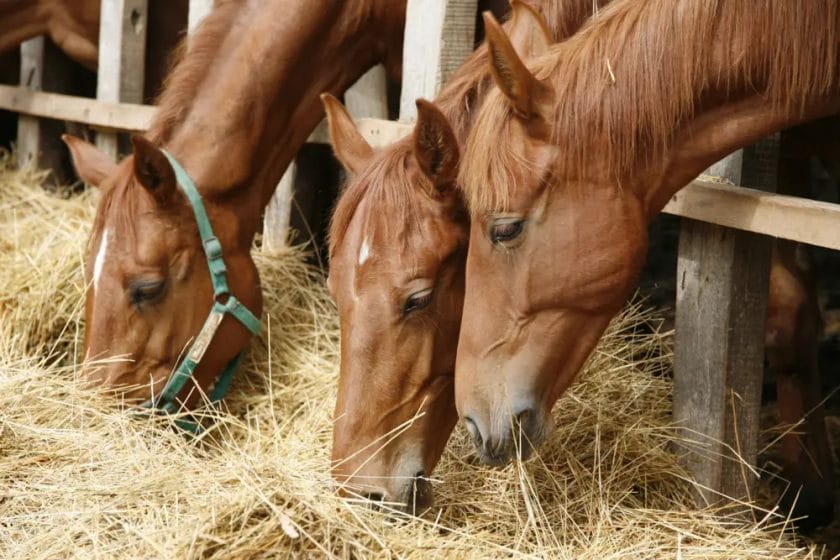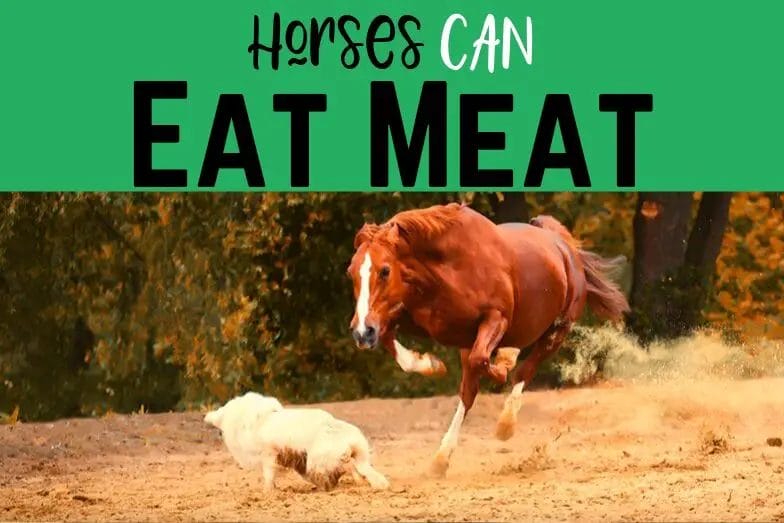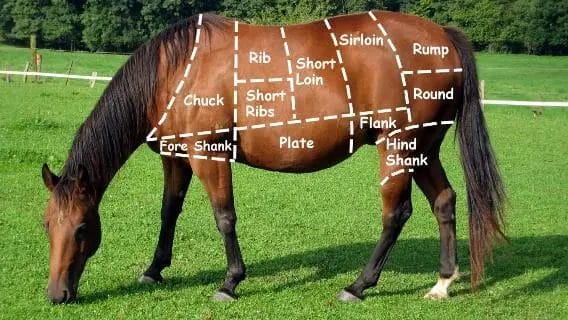Horses are herbivorous animals and their natural diet consists mainly of grass, hay, and other plant materials. They have evolved to efficiently digest and extract nutrients from plant-based foods. Unlike carnivorous animals, horses do not have the digestive enzymes necessary to break down and process meat. Their digestive systems are designed to process high-fiber foods, making them true herbivores.
Horses have a unique gastrointestinal system that includes a large fermentation chamber called the cecum, which aids in the breakdown of fibrous plant material. This specialized digestive system allows them to utilize the nutrients from plants effectively. While horses are capable of consuming small amounts of non-plant material, such as insects or the occasional accidental ingestion of animal products, it is not a natural or healthy part of their diet.
Feeding horses a diet that is high in fiber and plant-based materials is essential for their overall health and well-being. Nutritional imbalances or the inclusion of inappropriate foods can lead to digestive issues and other health problems in horses. It is important to provide horses with a diet that aligns with their natural herbivorous needs to ensure their optimal health and performance.

Understanding the Feeding Habits of Horses: What Does a Horse Eat?
When it comes to the feeding habits of horses, it’s essential for horse owners and enthusiasts to have a thorough understanding of what these magnificent creatures eat. Horses are herbivores, meaning they primarily consume plant-based materials. In this section, we will delve into the various components of a horse’s diet, their nutritional needs, and the importance of a well-balanced feeding regimen.
Hay and Forage
Hay and forage are the foundation of a horse’s diet. These include grass, legumes, and other plant materials that are harvested and dried for consumption. Horses should have access to good-quality hay or pasture for grazing throughout the day. This not only provides them with essential nutrients but also allows them to engage in natural feeding behaviors.
Grass hay is the most common type of forage, consisting of dried grasses such as timothy, Bermuda, or orchard grass. Legume hay, such as alfalfa or clover, is higher in protein and can be an excellent supplement for horses with higher energy requirements, such as growing foals or working horses.
Concentrates
In addition to hay and forage, horses may also be fed concentrates, which are commercially prepared mixtures of grains and supplements. These concentrates provide additional energy, protein, vitamins, and minerals to support a horse’s specific needs.
Common concentrates include grains like oats, barley, and corn, as well as pellet or sweet feed formulations. It’s important to select concentrates that are appropriate for the horse’s age, workload, and overall health. Feeding concentrates should always be done in moderation and in conjunction with ample hay or pasture to maintain a balanced diet.
Supplements
Supplements play a vital role in ensuring horses receive all the necessary nutrients for optimal health and performance. These can include vitamin and mineral supplements, probiotics, joint support supplements, and specialized formulas for horses with specific needs.
Supplements should always be used in consultation with a veterinarian or equine nutritionist to address any nutritional deficiencies or specific health concerns. It’s essential to follow recommended dosage guidelines to avoid over-supplementing, which can be detrimental to the horse’s well-being.
Water
Water is an often overlooked but critical component of a horse’s diet. Horses require a constant supply of fresh, clean water to maintain proper hydration and overall health. On average, a horse can consume anywhere between 5 to 10 gallons of water per day, depending on factors such as climate, exercise level, and individual needs.
Providing access to clean water at all times is essential, whether through automatic waterers, troughs, or buckets. Regularly monitoring water consumption and ensuring its availability can help prevent dehydration and related health issues.
Feeding Considerations
When developing a feeding plan for horses, several factors need to be considered:
- Age: The dietary needs of a foal or a senior horse differ from those of an adult horse. Young horses may require additional nutrients for growth and development, while older horses may have specific dietary requirements to support their aging bodies.
- Activity Level: Horses with higher activity levels, such as those involved in competitive sports or intense training, may require additional calories and nutrients to fuel their performance.
- Health Conditions: Certain health conditions, such as insulin resistance or gastric ulcers, may necessitate dietary modifications or specific supplements. Consulting with a veterinarian can help address these concerns.
Summary
In summary, understanding the feeding habits of horses is crucial for providing them with a well-balanced diet that meets their nutritional needs. Hay and forage should serve as the foundation, supplemented with concentrates and appropriate supplements. Access to clean water and careful consideration of age, activity level, and health conditions are essential for maintaining a horse’s overall health and well-being.

Nutritional Needs of Horses: Essential Components of a Horse’s Diet
Proper nutrition is essential for the overall health and well-being of horses. As grazing animals, horses have unique nutritional requirements that need to be met in order to maintain optimal health and performance. In this section, we will discuss the essential components of a horse’s diet and the importance of each nutrient.
1. Water
Water is the most important nutrient for horses. It plays a vital role in digestion, nutrient absorption, temperature regulation, and overall body function. Horses should have access to clean, fresh water at all times. On average, a horse needs to consume 5 to 10 gallons of water per day, but this can vary depending on factors such as weather, activity level, and diet.
2. Forage
Forage, which includes grass and hay, is a crucial component of a horse’s diet. It provides essential nutrients such as fiber, protein, vitamins, and minerals. Horses have evolved to graze for long periods of time, and their digestive systems are designed to process forage effectively. Ideally, horses should have access to pasture for grazing or high-quality hay as a substitute.
Forage not only supplies essential nutrients but also helps maintain proper digestive function by stimulating saliva production and promoting healthy gut flora. It is recommended that horses consume about 1 to 2% of their body weight in forage per day.
3. Concentrates
In addition to forage, horses may require concentrates to meet their nutritional needs. Concentrates include grains, such as oats, barley, and corn, as well as commercial feeds specifically formulated for horses. These concentrates provide additional energy, protein, vitamins, and minerals that may be lacking in the forage.
When feeding concentrates, it is important to consider the horse’s workload, age, and overall health. Overfeeding concentrates can lead to weight gain, metabolic issues, and digestive problems. Consult with a veterinarian or equine nutritionist to determine the appropriate amount and type of concentrates for your horse.
4. Vitamins and Minerals
Vitamins and minerals are essential for the overall health and function of horses. They play a vital role in various physiological processes, including bone development, immune function, and energy metabolism. While forage and concentrates provide some vitamins and minerals, horses may require additional supplementation.
The specific vitamin and mineral requirements vary depending on the horse’s age, breed, activity level, and overall health. It is recommended to have a forage analysis done to determine any nutrient deficiencies and consult with an equine nutritionist to develop a supplementation plan if necessary.
5. Salt
Salt is an often overlooked but important component of a horse’s diet. Horses require salt for proper electrolyte balance and to encourage water consumption. Providing a salt block or adding salt to the horse’s feed can help meet their salt requirement. It is important to choose a salt source that does not contain any additives or additional minerals.
6. Feeding Schedule
Establishing a consistent feeding schedule is crucial for maintaining a horse’s health and digestion. Horses have a sensitive digestive system that requires regular, small meals throughout the day. Aim to feed your horse at the same times each day, dividing their total daily ration into multiple smaller meals.
When introducing any changes to a horse’s diet, it is important to do so gradually to prevent digestive upset. Sudden changes in feed or forage type can lead to issues such as colic or laminitis.
Summary
Meeting the nutritional needs of horses is essential for their overall health, performance, and well-being. A balanced diet that includes adequate amounts of water, forage, concentrates, vitamins, minerals, and salt is necessary to support optimal body function and prevent nutritional deficiencies. Consulting with a veterinarian or equine nutritionist can help ensure that your horse’s diet is tailored to their specific needs.

4. Common Misconceptions: Dispelling the Myth about Horses Eating Meat
One of the most persistent misconceptions about horses is the belief that they are carnivorous creatures that consume meat as part of their diet. However, this notion is entirely false and lacks any scientific basis. In this section, we will delve into the reasons why horses are herbivores and explore the origins of this myth.
The Herbivorous Nature of Horses
Horses are classified as herbivores, which means they primarily feed on plant-based materials. Their digestive system is specifically adapted to process plant matter efficiently. The complex structure of their teeth, along with the length and functionality of their intestines, further supports their herbivorous nature.
Horses have evolved to eat fibrous plant material, such as grass and hay, which provides them with the necessary nutrients and energy. Their teeth are designed to grind and chew plant matter, while their lengthy intestines aid in the breakdown and absorption of nutrients.
The Origins of the Myth
It is unclear how the myth about horses eating meat originated, but it may be attributed to several factors. In some ancient cultures, there are tales and myths that depict horses consuming flesh. These stories are often steeped in folklore and should not be taken as factual representations of a horse’s diet.
Another possible reason for the misconception could be the occasional instances of horses exhibiting unusual behavior, such as nibbling on bones or showing curiosity towards meat. However, these behaviors are not indicative of a horse’s dietary preference. Horses may engage in such actions out of curiosity or boredom, but it does not imply that they have a natural inclination towards consuming meat.
Social Media and the Spread of Misinformation
In recent years, the rise of social media has contributed to the perpetuation of false information, including the myth of horses eating meat. Misleading videos or images shared without proper context can easily misinform and confuse the public.
It is essential to critically evaluate the sources of information and consult credible scientific research before accepting any claims about horses or any other topic. Veterinarians, equine experts, and reputable equine organizations can provide accurate and reliable information regarding a horse’s dietary needs.
Conclusion
In summary, horses are herbivores and do not have a natural inclination towards consuming meat. The belief that horses eat meat is a common misconception that lacks scientific evidence. It is crucial to rely on accurate sources of information and consult experts to dispel myths and misconceptions surrounding horses and their dietary habits.
The Importance of a Balanced Diet for Horse Health and Well-being
A balanced diet is crucial for maintaining the health and well-being of horses. Horses are herbivores, and their digestive system has evolved to process high-fiber plant material. It is essential to provide them with a diet that meets their nutritional needs to ensure optimal health.
1. Forage:
Forage should form the basis of a horse’s diet. It includes grass, hay, and other plant material rich in fiber. The digestive system of horses relies on a continuous intake of forage to function properly. It helps promote healthy gut function, prevents digestive issues, and provides essential nutrients.
2. Concentrates:
In addition to forage, horses may require concentrates to meet their energy and nutrient requirements. Concentrates include grains, such as oats, barley, and corn, as well as commercial pelleted feeds. These feeds are formulated to provide a balanced mix of proteins, carbohydrates, fats, vitamins, and minerals.
3. Protein:
Protein is essential for the growth and repair of body tissues in horses. High-quality protein sources, such as soybean meal, canola meal, and alfalfa, should be included in their diet. However, excessive protein intake can lead to health issues, so it is crucial to provide the right balance based on the horse’s age, activity level, and health status.
4. Vitamins and Minerals:
Horses require a variety of vitamins and minerals to support their overall health. These include vitamin A, vitamin E, vitamin D, calcium, phosphorus, magnesium, and more. While forage and concentrates can provide some of these nutrients, it may be necessary to supplement the diet with additional vitamin and mineral supplements to ensure adequate intake.
5. Hydration:
Proper hydration is critical for horses’ health and well-being. They require access to clean and fresh water at all times. Water helps regulate body temperature, aids digestion, and supports various bodily functions. Horses should consume a significant amount of water daily, especially during hot weather or periods of intense physical activity.
6. Feeding Schedule:
Establishing a regular feeding schedule is essential for horses. They are creatures of habit and thrive on routine. Implementing a consistent feeding schedule helps maintain their digestive health and prevents issues such as colic. Horses should be fed small meals throughout the day rather than one large meal to mimic their natural grazing behavior.
7. Balancing Calorie Intake:
It is crucial to balance the calorie intake of horses based on their activity level, age, and body condition. Overweight horses are prone to health issues like laminitis, while underweight horses may lack essential nutrients. Monitoring their body condition and adjusting their diet accordingly can help maintain a healthy weight.
In summary, a balanced diet plays a vital role in promoting the health and well-being of horses. Providing a diet rich in forage, concentrates, protein, vitamins, and minerals, along with proper hydration and a regular feeding schedule, ensures that horses receive the necessary nutrients for optimal health and performance.
FAQs
Do horses eat meat?
No, horses are herbivores and their natural diet consists mainly of grass and hay. They have evolved to digest plant material rather than meat, and their digestive system is not equipped to process animal protein.
Conclusion
In conclusion, horses are herbivores and do not naturally eat meat. Their digestive system is designed to process plant material, and they derive their nutritional needs from a diet rich in grasses, hay, and grains. While there may be rare cases where a horse accidentally ingests small amounts of meat, it is not a part of their regular diet and can have adverse effects on their health.
It is important for horse owners and caregivers to provide a balanced and appropriate diet for these magnificent animals, consisting of quality forage, mineral supplements, and clean water. By understanding and meeting their dietary needs, we can ensure the well-being and longevity of our equine companions.
